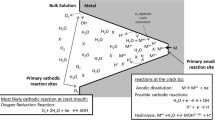Abstract
Environmental cracking is a term used to encompass all types of cracking that occur as a result of interaction of a metal and its environment, such as stress-corrosion cracking, corrosion fatigue, liquid metal embrittlement, etc. From an engineering viewpoint, the most interesting and dangerous corrosion failure of a metal component is obviously the stress-corrosion cracking (SCC) - a phenomenon associated with a combination of static tensile stress and a specific corrosive environment.
Access this chapter
Tax calculation will be finalised at checkout
Purchases are for personal use only
Preview
Unable to display preview. Download preview PDF.
Similar content being viewed by others
References
HL Logan Film-rupture mechanism of stress-corrosionJ. Research N.B.S.4899 (1952).
T. P. Hoar, J. M. West, Mechanochemical anodic dissolution, Nature 181:835 (1958).
T. P. Hoar, J. M. West, Mechanochemical anodic dissolution of austenitic stainless steels in hot chloride solution, Proc. Roy. Soc. A268:304 (1962).
T. P. Hoar, Stress-corrosion cracking, Corrosion 19:331 (1963).
FP Ford, Stress-corrosion cracking in:“Corrosion Processes” RNParkins, ed., Applied Science Publishers, London (1982).
RN Parkins Stress-corrosion cracking, in:“Environment-Induced Cracking of Metals”RPGangloffMBIves, eds., NACE Houston (1990).
RC Newman, M Saito, Anodic stress-corrosion cracking: slip-dissolution and film-induced cleavage, in:“Corrosion-Deformation Interactions”, JM Gras, T Magnin, eds., Les Editions de PhysiqueLes Ulis (1993)
R. N. Parkins, Mechanisms of stress-corrosion cracking, in:“Corrosion”, vol. 1, L. L. Shreir, R. A. Jarman, G. T. Burstein, eds., Butterworths, London (1994).
R. W. Revie, Environmental cracking of metals, in:“Modern Aspects of Electrochemistry”, vol. 26, B. E. Conway, J. O’M. Bockris, R. E. White, eds., Plenum Press, New York (1994).
R. G. Raicheff, A. Damjanovic, J. O’M. Bockris, Dependence of the velocity of anodic dissolution of iron on its yield rate under tension, J. Chem. Phys. 47:2198 (1967).
A. R. Despic, R. G. Raicheff, J. O’M. Bockris, The mechanism of the acceleration of the electrodic dissolution of metals during yielding under stress, J. Chem. Phys. 49:926 (1968).
A. R. Despic, R. G. Raicheff, The crack-propagation rate in terms of the electrochemical mechanism of stress-corrosion cracking of metals, Compt. Rend. Acad. Buig. Sci. 24:1361 (1971).
J. O’M. Bockris, Electrode kinetics, in:“Modern Aspects of Electrochemistry”, vol. 1, J. O’M. Bockris, ed., Butterworths, London (1954).
N. Tanaka, R. Tamamushi, Kinetic parameters of electrode reactions, Electrochim. Acta 9:963 (1964).
H. L. Logan. “The Stress Corrosion of Metals”, J. Wiley, New York (1968).
N. J. Petch, The lowering of the fracture-stress due to surface adsorption, Phil. Mag. 1:331 (1956).
Author information
Authors and Affiliations
Editor information
Editors and Affiliations
Rights and permissions
Copyright information
© 1996 Plenum Press
About this chapter
Cite this chapter
Raicheff, R. (1996). An Electrochemical Model for Environmental Cracking of Metals. In: Gonis, A., Turchi, P.E.A., Kudrnovský, J. (eds) Stability of Materials. NATO ASI Series, vol 355. Springer, Boston, MA. https://doi.org/10.1007/978-1-4613-0385-5_51
Download citation
DOI: https://doi.org/10.1007/978-1-4613-0385-5_51
Publisher Name: Springer, Boston, MA
Print ISBN: 978-1-4613-8028-3
Online ISBN: 978-1-4613-0385-5
eBook Packages: Springer Book Archive




